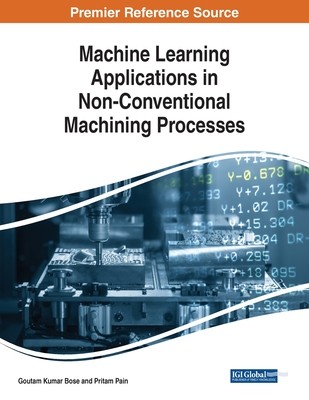
- We will send in 10–14 business days.
- Publisher: Igi Global Engineering Science Reference
- Year: 2020
- ISBN-10: 1799836258
- ISBN-13: 9781799836254
- Format: 21.6 x 27.9 x 1.8 cm, softcover
- Language: English
- SAVE -10% with code: EXTRA
Machine Learning Applications in Non-Conventional Machining Processes (e-book) (used book) | bookbook.eu
Reviews
Description
Traditional machining has many limitations in today's technology-driven world, which has caused industrial professionals to begin implementing various optimization techniques within their machining processes. The application of methods including machine learning and genetic algorithms has recently transformed the manufacturing industry and created countless opportunities in non-traditional machining methods. Significant research in this area, however, is still considerably lacking. Machine Learning Applications in Non-Conventional Machining Processes is a collection of innovative research on the advancement of intelligent technology in industrial environments and its applications within the manufacturing field. While highlighting topics including evolutionary algorithms, micro-machining, and artificial neural networks, this book is ideally designed for researchers, academicians, engineers, managers, developers, practitioners, industrialists, and students seeking current research on intelligence-based machining processes in today's technology-driven market.
EXTRA 10 % discount with code: EXTRA
The promotion ends in 19d.14:47:46
The discount code is valid when purchasing from 10 €. Discounts do not stack.
- Publisher: Igi Global Engineering Science Reference
- Year: 2020
- ISBN-10: 1799836258
- ISBN-13: 9781799836254
- Format: 21.6 x 27.9 x 1.8 cm, softcover
- Language: English English
Traditional machining has many limitations in today's technology-driven world, which has caused industrial professionals to begin implementing various optimization techniques within their machining processes. The application of methods including machine learning and genetic algorithms has recently transformed the manufacturing industry and created countless opportunities in non-traditional machining methods. Significant research in this area, however, is still considerably lacking. Machine Learning Applications in Non-Conventional Machining Processes is a collection of innovative research on the advancement of intelligent technology in industrial environments and its applications within the manufacturing field. While highlighting topics including evolutionary algorithms, micro-machining, and artificial neural networks, this book is ideally designed for researchers, academicians, engineers, managers, developers, practitioners, industrialists, and students seeking current research on intelligence-based machining processes in today's technology-driven market.


Reviews